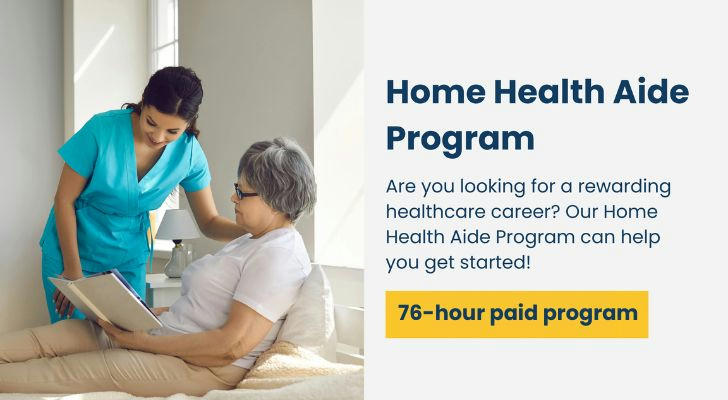Government-Funded HHA Training for Adults 45+: Start a New Career in Healthcare
If you’re 45 or older and looking for a stable, meaningful, and flexible second career, becoming a Home Health Aide (HHA) could be the perfect choice. Thanks to Government-Funded HHA Training, adults can now gain the essential skills and national certification without high tuition costs or prior experience.
These programs are specifically designed for midlife learners who want to re-enter the workforce, make a difference, and enjoy a reliable income — all while training under the federal 75-hour HHA certification standard.

🌟 Why Choose Government-Funded HHA Training
No Experience Required
Whether you’ve worked in retail, administration, or raised a family — this path is open to everyone. No prior healthcare background is needed.
Government Financial Support
Eligible students can access Government Funded HHA Training, with tuition and material costs significantly reduced through state or federal support programs, helping students ease the financial burden of study.
Flexible Learning Options
Many schools offer Online HHA Training Courses, allowing you to complete theory lessons online and attend hands-on clinical practice near you.
Nationally Recognized Certification
Upon completing the 75-hour HHA training program, you’ll earn your HHA Certification Online or in person, qualifying you to work in home care, assisted living, and hospice settings.
Strong Job Demand Nationwide
With America’s aging population, the demand for HHAs is expected to grow 21% by 2033 (U.S. Bureau of Labor Statistics). Compassionate adults aged 45+ are highly valued in this field.
What You’ll Learn in 75 Hours of Training
Your Home Health Aide Training Classes Near Me will typically include:
60 hours of online or classroom study, covering:
Basic medical care (vital signs, infection control)
Nutrition and patient safety
Communication, ethics, and patient rights (HIPAA)
End-of-life and elderly care fundamentals
15 hours of supervised clinical practice, where you’ll apply your skills in real-life care settings.
This 75-hour combination meets federal and state HHA standards, ensuring you’re fully prepared to start working upon certification.
Career Outlook & Salary After Certification
For adults over 45, this career offers both purpose and security.
Average Pay: $16–$20 per hour (or $32,000–$40,000 per year, depending on state)
Employment Settings: Home care agencies, assisted living facilities, hospice centers, hospitals
Career Growth: Many HHAs later advance to Certified Nursing Assistant (CNA) or Licensed Practical Nurse (LPN) roles for higher earnings and leadership opportunities.
With government support and short, focused training, you can transition into healthcare in just a few weeks — and make a lasting impact in people’s lives.

📝 How to Apply for Government-Funded HHA Training
Applying for Government-Funded HHA Training is simple:
Find a State-Approved Program
Search for “Home Health Aide Training Classes Near Me” or visit your state’s Department of Labor or Workforce Development website. Look for programs approved under WIOA or local healthcare education partners.
Check Eligibility for Funding
Many applicants aged 45 and above qualify for tuition assistance if they are unemployed, underemployed, or changing careers.
Enroll in an Online or Hybrid Program
Most schools offer Online HHA Training Courses with flexible schedules, allowing you to complete lessons at your own pace and attend short clinical sessions nearby.
Complete the 75-Hour Curriculum & Pass the Competency Exam
Once you meet the federal HHA certification standard, you’ll receive your certificate and can start applying for jobs immediately.
Connect with Employers
Many training providers partner with home care agencies that hire graduates directly—some even offer paid placements or job guarantees.
Take the First Step Toward a Meaningful Career
It’s never too late to build a new future. Explore Government-Funded HHA Training programs near you and discover how a 75-hour HHA certification can open the door to a respected, in-demand healthcare career — perfectly suited for adults aged 45 and beyond.
